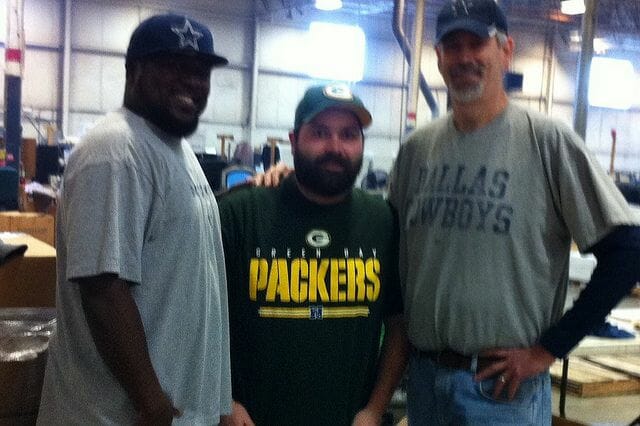Probably most people think that being hired or promoted as a manager in a shop means that you are in charge of a series of tasks or outcomes, or even an entire “department”; but in truth the cold, honest fact is that your main responsibility is people-centric. There is a staff and they report to you. They are your daily responsibility. That doesn’t just mean that they have to ask you to take a day off, or you are the person they call when they have the flu. That’s not management. What they do all day is what makes your company tick, and that’s your area of concern.
Their entire lives and careers are in your hands. Their performance and the impact that they have on your shop, is directly tied to how well you motivate, train, and cultivate their skills performing their jobs. Nobody was born with the ability to pull a squeegee, load a digital printer, or thread an embroidery needle. Fantastic graphic designers don’t have a clue how to separate a simulated process file unless they are taught. Customer service or sales teams won’t know the terms placket, pique, or ringspun unless you teach them.
Managing is a daunting task, and often full of roadblocks, landmines and daily struggles. It is also fun and a great opportunity to blossom as a leader if you do everything correctly. How well you handle this task can make a direct impact on the performance of your team. Is this a challenge you are comfortable in rolling up your sleeves and digging in everyday? It’s not for the weak.
I thought it might be fun to jot down the basic building blocks of what I think that makes a great decorated apparel industry shop manager. Maybe you own a small shop tucked away somewhere, and shop “management” is just you alone, but now you have a few people working with you. This applies to you also. Let’s see if you agree with my points. Feel free to add your own in the comments section! These are not ranked in order of importance, but I would wager that some of these are more important than others.
Set a Great Example – As a leader in the company everything you do, say and perform is constantly reviewed and critiqued by others. Especially by the people that work for you. You can’t hold your team accountable for tardiness if you are constantly five minutes late to everything. Don’t stroll in with a cup of coffee in your fist and start the day by asking what’s going on. You just look like a pretentious jerk.
Your job will be incredibly more difficult in motivating others to excel in their performance if you are constantly making mistakes yourself. If you want a perfect team, then you need to strive be the perfect leader. If you enter orders, they need to be created error free. If you print or embroider in production, they need to be run correctly and at the speed you want out of your team. Be detail oriented, and hyper-focused on leading the way by setting the bar for others to follow. Can you do that?
Think of it this way, you are on stage every day. Your actions, the way you speak when upset, how you handle yourself, the instructions you give, even the daily tone of your voice; it is all being absorbed and rechanneled by the staff you manage. Your team talks about you. Especially the moment that you walk away after barking some “inspiring” order. Are you giving them ammunition to shoot you down? Are you giving them building blocks to build your company instead? What do you think happens? Before you can insist on excellence in others, insist on excellence in yourself. It all starts with you.
Also, there’s a phrase that I’ve always liked, “Man supports what he helps create”. If you want to really develop your team and company, then ask and get feedback from the troops on how to make things better. What are their pain points? Do they need a tool, some better equipment, or clearer instructions on the work order? If you want your team to help carry out the change necessary for the success, get them involved in the discussion on what’s needed. They are more apt to make sure it will be a success than if you just cram it down their throats. That’s setting a good example.
Humor – this is an outstanding trait to have when dealing with people. A good-natured manager that appreciates people and sees the humor in things can really make a difference. People love to smile, so if you can get them to show some teeth and laugh while they work, you may be ahead of the game. Nobody likes to work for emotionally stunted humorless robots. Can you make work more fun?
Of course, there’s an invisible line that can’t be crossed. So don’t drag out your dirty joke book just yet. For me, using humor in situations, especially challenging ones, can help ease tension and refocus the challenge from a problem to an opportunity. Some people might be a little sensitive, so don’t make the joke about them. Choose something else, even yourself, and show some wit. Smile. Be in a good mood. Humor makes things better.
Clear Expectations – This probably is the most important one on my list. People want to know what to do, how to do it, and what should they do next. They need clear cut instructions. Goals can’t be a secret. Whatever the final result you are measuring your staff against for performance, they need to understand that at all times. It can’t be a moving target. The fun doesn’t stop there either. It’s your job as a manager to help them not only achieve that goal, but to completely dominate it. To kill it. To be the world champion. That’s the purpose of expectations; to set the bar and then surpass it.
How are you going to do that? It mostly depends completely on your relationship with that employee. What are they lacking?
Skill can be acquired through training and time doing the work.
Motivation comes from many sources, but it’s up to you to find out what button to push.
Desire comes from understanding what will be the benefit once the goal is obtained.
The tricky part is that what might work for one person, will completely fail with the next. There rarely will be blanket answers that work for everyone. That’s why managing is relationship based. If you are the person that just sits in an office reviewing numbers and spewing out instructions, you are going to fail miserably in managing anybody. You have to have a personal connection and get involved. Constant discussions describing the expectations about the work is always the best way to move the bar with performance. Define the goal you want to achieve constantly. Talk about it. Celebrate it.
Rules – Every company has them. There are written rules, such as those found in your employee handbook. (You have one of those, right?) There also are unwritten rules, such as how to answer the phone or cleaning up your gigantic mess in the breakroom after lunch. Does your staff follow the rules? Do you enforce them? The funny thing about having rules is that if you aren’t making sure they are being followed people will just do what they want. Sooner or later you’ll stop and look and nobody is back from lunch and it is fifteen minutes past when they are due. Or that report you needed is three days late. Or nobody put the cones of thread away, or returned the ink bucket back to the shelf.
As much as enforcing rules feels a lot like babysitting or even parenting, it’s necessary. You want all of your canoes paddling in the same direction, so sometimes you have to nudge one back with a simple conversation. If you don’t see the results you want, then be sure to start with some discipline and write-ups, even suspensions or termination. Treat everyone fairly and the same way. Whatever you do, don’t say “I’m sorry to have to do this…” You aren’t sorry, this is a behavioral problem that the employee created by not caring enough about something to do it correctly.
Do yourself a favor and just take note how people work at the beginning of the day, right after lunch, and just before everyone is supposed to leave. What happens? Your rockstar workers will be the ones hustling and have the “get ‘er done” mindset. Your deadwood type workers will be the ones milling around looking like they are working, but not adding any value to your day. Reward the rockstars, refocus the work for the deadwood. In your shop, after the start of the day, after break or lunch…how long until the first shirt is completed? Stand there and time it. Five minutes? Ten? Longer? I’ll bet you will be surprised. This is why you need rules.
Look Ahead – Part of your job is to look ahead and strategize on what might be coming around the corner. What are the potential problems lurking in the shadows? Can your team spot them? They may be nose to the grindstone working on getting orders produced and not cognizant of a future challenge. That big order that’s due next week? What day do you need to start it? Inventory in and art approved? Who on your team is following up on potential challenges?
Your job is to avoid these problems by mitigating the circumstances and situations that could create them. Get your team ready with training. Cross training with time doing another task in your shop works wonders with connecting the dots. Get the CSR team out in receiving and have them count some orders, or have the art department learn how to register their work on a press to learn why you set up the screen order a certain way.
If your team can pivot quickly and adapt to market changes that may give you a great advantage over your competition. Noting what’s up ahead and making that adjustment is difficult. How do you react? Can you instantly take a big order and produce it with minimal overtime? Can you print a hot market job after the local team wins the championship?
Get Organized – The uninformed, the unprepared and the untrained in this industry get left in the dust by those that work towards a better future. Pull your strategy together and be prepared for every day in your shop. A well-organized shop is chock full of people who are looking ahead to tomorrow, the next day and even a week out. They want everything organized and ready so things run smoothly. Inventory is counted and received, files digitized and screens burned all ahead of time.
If you are managing production make sure all of your hot jobs are running first thing in the morning. For office or art managers, get your biggest and most important tasks completed early in the day. Prioritize. Are you ahead of schedule or behind? Do you have one team doing all the work, but others aren’t as engaged? Get some teamwork inserted and spread the tasks so it’s easier for everyone. What happens tomorrow is set up by what is accomplished today.
Managing is about leadership, and sometimes this involves pushing people and making changes. Don’t think a workflow is as efficient as it should be? Change it! Organize the way things happen. Involve your team and challenge them to come up with a better solution. If you hear “that’s the way we’ve always done it”, you are in trouble. Get the concrete out of their head and start opening their minds to looking for a better way of working.
Learning – This is a critical component to management and leadership. How stagnant is your thinking? Are you constantly looking, reading, talking, or thinking of better ways of doing in your shop? There is always a better way. When I talk to shop owners I’m always amazed at the low percentage of them that invest time in researching and reading about the industry they build their future upon. The information is out there, you just have to grab it.
Want to learn to print four color process, sew puff embroidery, or build a better website? Take a class, read a book, watch a webinar online, bring in a consultant. There are thousands of ways you can make your shop run better. The successful shops all have their top teams constantly learning, as this has a direct effect on the growth of their company. They are ready when that order comes in, markets shift, or an opportunity drops in their lap.
If you are managing you need to be constantly learning. It’s part of your job. Nobody is going to do it for you, so you need to find the time.
Feedback and Accountability – Interacting with your staff should be a daily task for any manager. You need to be able to gauge the skill level and attitude for every worker you manage. Give them constant feedback and encouragement. Motivate them to learn new skills by challenging them and giving them opportunities. Let the embroidery trimmer hoop some polos one day and learn to thread a machine. Get your screen-print catcher some time pulling a job or even running the machine on a long run. Watch your staff and let them know what they are doing right, and also wrong.
Say Thank You. Often.
If mistakes are made, or you have staff members that aren’t quite pulling their weight it is up to you to correct that by holding them accountable for their actions (or inactions sometimes). This sometimes means you have to take disciplinary action with write-ups, suspensions, and terminations. Trust me, over the years almost all of the people I have let go have been replaced with someone much better. As much as you may actually like someone, the longer you keep a problem employee the worse it gets for everyone else on your team. The other workers may even start wondering why you haven’t done anything about that slacker on your team. Don’t wait. Have discussions, give clear expectations about what needs to be corrected and document the talks. When it comes time to let the person go, it shouldn’t be a surprise.
Sometimes though, you’ll find that there’s a reason behind what’s going on and it may shock you. A good worker that’s suddenly late all the time could be dealing with a parent with cancer. A normally cheerful and motivated employee could be getting a divorce. This is where being a manager can get tough. Be human, discuss what needs to happen, and work towards a solution that will work for everyone. Don’t just come down on people like a load of bricks.
Managing people is always a challenge. That’s probably why I like it so much. If you are having problems with your managers in your company or just new to a management role and need some help, be sure to shoot me an e-mail at matkinson4804@gmail.com and I’ll see if I can help you with your problem.



1 comment
Timothy P. Atkinson
The greatest leader is not necessarily the one who does the greatest things. He is the one that gets the people to do the greatest things. – Ronald Reagan